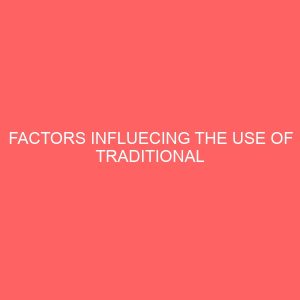Description
Factors influecing the use of traditional medicine in the treatment of malaria among the residents of Arulogun area, Ede, Osun state.Abstract
Malaria has been known to be a deadly disease. Previous studies have shown increased use of traditional medicine in the treatment of diseases especially malaria. Individuals have oftentimes used traditional medicine to treat malaria. Even in an era of modern medicine, most individuals still resort to the use of traditional medicine, especially in rural areas. The general objective was to determine the factors influencing the use of traditional medicine in the treatment of malaria among residents of Arulogun area, Ede, Osun state. A descriptive, cross-sectional study was adopted for this study. A structured questionnaire comprising four sections was distributed to 320 residents in five selected communities in Arulogun area. Data was analyzed using SPSS version 23. Out of the 313 participants interviewed, 66.5% were females, since they are seen as the caretakers of the home, most respondents (38.6%) fall between the age bracket of 48-62 years, 35.1% are secondary school certificate holders while 48.6% are traders. Most respondents (30.5%) had poor knowledge of malaria and traditional medicine used for malaria treatment. Their poor knowledge of malaria and traditional medicine used for malaria treatment can be attributed to their low educational level. It was revealed that Ewe Oronbo (lime leaves) (2.70), Dogonyaro (Neem leaves, stem bark and roots) (2.59), and Ekpo mangoro (mango bark and leaves) (2.58) ranked high as they were significantly used in the study area. Certain factors are predictors indicating the use of traditional medicine. In this study, it was found that unavailability of drugs, distance of health facilities, better and faster result of herbal medicine, natural taste of herbal medicine, close proximity to herbal medicine, influence from family/relatives/peers, availability of traditional healers and








Reviews
There are no reviews yet.